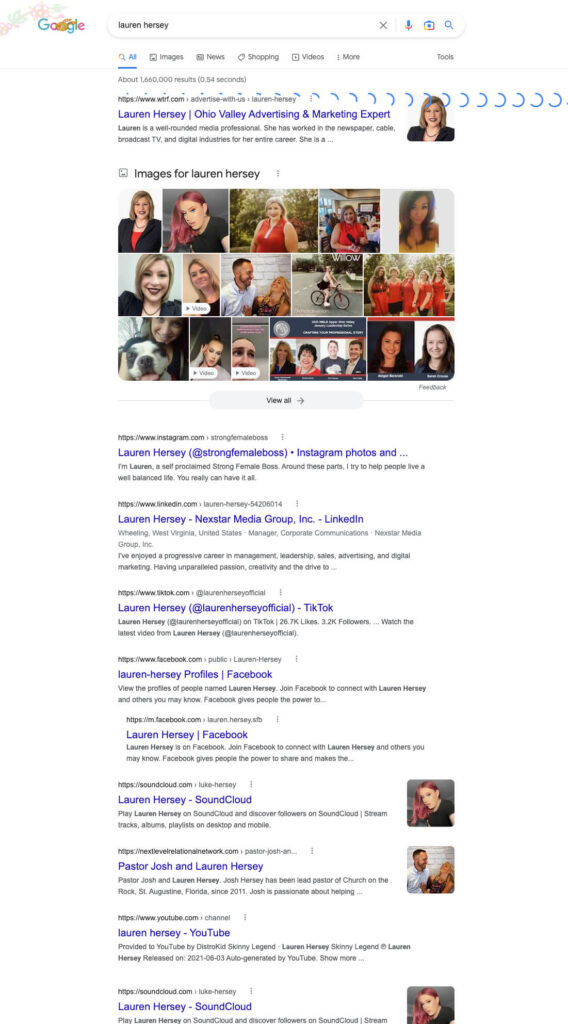Have you ever Googled someone?
Of course you have.
What sparked your curiosity and what were you looking to find?
Reasons Why You Google Search Someone
Let’s be real honest, you aren’t looking online to see all of the nice things about someone. You are searching to disqualify someone.
Searching for someone online comes down the following:
- Employment or Hiring
- Potential Dating Prospect
- Business or Professional Agreements
- Potential Harm – identity theft/stalking
The internet makes it easy for us to call someone’s bluff. If you say you’ve done something over the last twenty years, there’s gonna be some type of record of it on the internet.
Sorry kids – job interviews are a bit more difficult these days. There’s no need to call your references when we can just ask Google, Bing, or even Jeeves (throwback Internet joke for you old folks).
If you want to learn something about someone, you can just search their name.
What will you find when you Google Search someone’s name?
When you search for your average* persons name, you will often find in the top ten search results:
- Image gallery
- Facebook profile
- Instagram profile
- Twitter profile
- LinkedIn profile
- YouTube profile
- Local News mentions
- Local Website or Bio from Company page
*non-celebrity
Every person will vary, especially based on the popularity of their name. The more unique, the easier to single out the profiles and articles that are distinctly about an individual.
Most of the suggested websites are social networks. Unless the person built their own website, you will likely rely on these social channels to find answers to your burning questions.

Accessing Someone’s Information on Social Networks
It’s wise to lock your profiles down so that random searchers can’t access your personal information. Each social channel has different levels of access. If you leave access wide open, you open yourself up for potential problems.
Millions of users have their pet name as a password. It’s not hard to find the name of your pet online.
Two thirds of burglaries happen when you’re not home. Vacation pictures are fairly common on social. Come on in Wet Bandits.
Want to call off work? There are a lot of employers that will be looking to see your activity that day.
It’s a good idea to keep your information as private as possible.
It’s Your Turn to Google Search – What to Look For
We are not just going to take someone’s word. As nice as that sounds, we are not naive. Search is free and not at all hard to do. Let’s spend 15-30 minutes looking up some general information.
Hiring an Employee – Getting a Job
Whether you are checking out a potential babysitter or looking to hire your next manager, what you find online will help make or break your decision.
Whether you are doing the searching or you are being searched, you are not limited to page one.
For a typical search, most users never make it past the 6th or 7th result. For investigate work, someone might check every search engine result page available.
(Have you ever got to the point where Google tells you they’ve showed you all of the good results? See Below.)

Sometimes the most obscure results come up on page two-ten. You will find wedding announcements, old high school sport box scores, and the occasional criminal record.
If you want refined results, throw in a city as a modifier.
Social media accounts are great when users want to proactively share their activities. Google results are usually where you find items they don’t want you to know about.
Potential Dating Prospect
I can’t imagine there’s much of a difference between researching an employee and formidable companion.
- Do they have a criminal history?
- Where have they worked?
- Who do they know that’s in your circle?
- Do any lies come to the surface?
Sifting through social media is typically helpful in gathering your mutual friends. Unlike when individuals are looking for a job, you can causally ask a friend for an opinion without outing someone looking to jump careers.
It’s likely you will need to dig deep and move beyond those first 10 results.
Business and Professional Agreements
Did you meet someone interesting at a chamber lunch or networking event? Maybe they are looking to partner with you or sell you a service. Google to the rescue.
Most legitimate brand ambassadors have information on search detailing their professional involvement. Searching the persons name and business will give you plenty of results and should be unique.
LinkedIn will be a common result. From there, you can check to see who they are mutually connected with.
Do they have any testimonials? Are they sharing opinions and articles?
Check Twitter or Facebook as well. How controversial are their posts? Is this something you want to be linked to your name?
If you are going to partner with another brand or person, what’s their reputation? Are they listed in the news as a company or person? Let’s hope it’s for good causes.
Google reviews. Yelp reviews. BBB reviews. Check and read them. Granted, a person is not their company but sometimes the apple doesn’t fall far from the tree.
Bad News – Change the Google Results
You have changed but some of your past still lingers. Maybe you made some bad decisions as a young adult or ran with the wrong crowd. Not everyone is forgiving and not everyone will give someone a chance.
You want to get rid of some negative articles on the internet.
Bad news, you really can’t. If you have a criminal record, you won’t get the local website to remove your name from their page.
(I’m also not in the business of helping serious criminals, so you won’t find the answers here.)
But if you’ve been negatively associated with a some scumbags or shady businesses, you can try and push these results as far down the Google search as you can.
People will search a bit deeper, but they will give up at a certain point. If you have an article or image you don’t like on page 6, create quality content to help push it down to page 10.
If there are 20 great articles about you and your company and one negative from years ago, even if it comes to surface, the more recent positive news will trump the embarrassing or negative result.
This is often called reputation management and is a bit more complex and detailed, but you get the gist.
Why is Google Your About Page?
Your website’s about page’s purpose is to help gain your customers confidence.
You can show testimonials on your page.
Explain your process and solutions.
You can list your partners and contacts.
These are all great things…but we know YOU have the control over this content.
Of course you will show happy customers. Case studies will all be about how amazing you did. The staff will look jolly and talk about their pets and favorite hobbies.
We are smarter than that as consumers.
We will check out your about page, but we will go to Google to get the truth.
What’s your Google rating? Has the CEO been arrested? Are you a fraud?
The search results will expose you and WE know it as consumers.
It’s important to understand the importance of your name and brand on Google. You can’t control all of it, but you can control enough to make a difference.
You may have your “about page” as your #1 reference, but Google is the mutual friend we have that will tell us the truth about you.
If you are interested in learning how to manipulate your Google results, may I recommend following. Jason Barnard – The Brand SERP Guy. I agree with him. He proclaims that Google is your new business card…which is a lot like your About page. His book The Fundamentals of Brand SERPs for Business is a great look into how you can manipulate the results and tell search engines who you are and what people should see.

About the Author
Eric Hersey
Eric is your Ohio Valley Web Design and a Content Marketing Specialist. Eric’s main goal is to Make a Better Web for the Ohio Valley. Eric helps local businesses and brands create content calendars, social media strategies, and provides guidance on what pages and topics to create that will deliver RESULTS. Eric has published hundreds of original articles over the past several years (web design, SEO, content marketing, and branding).



